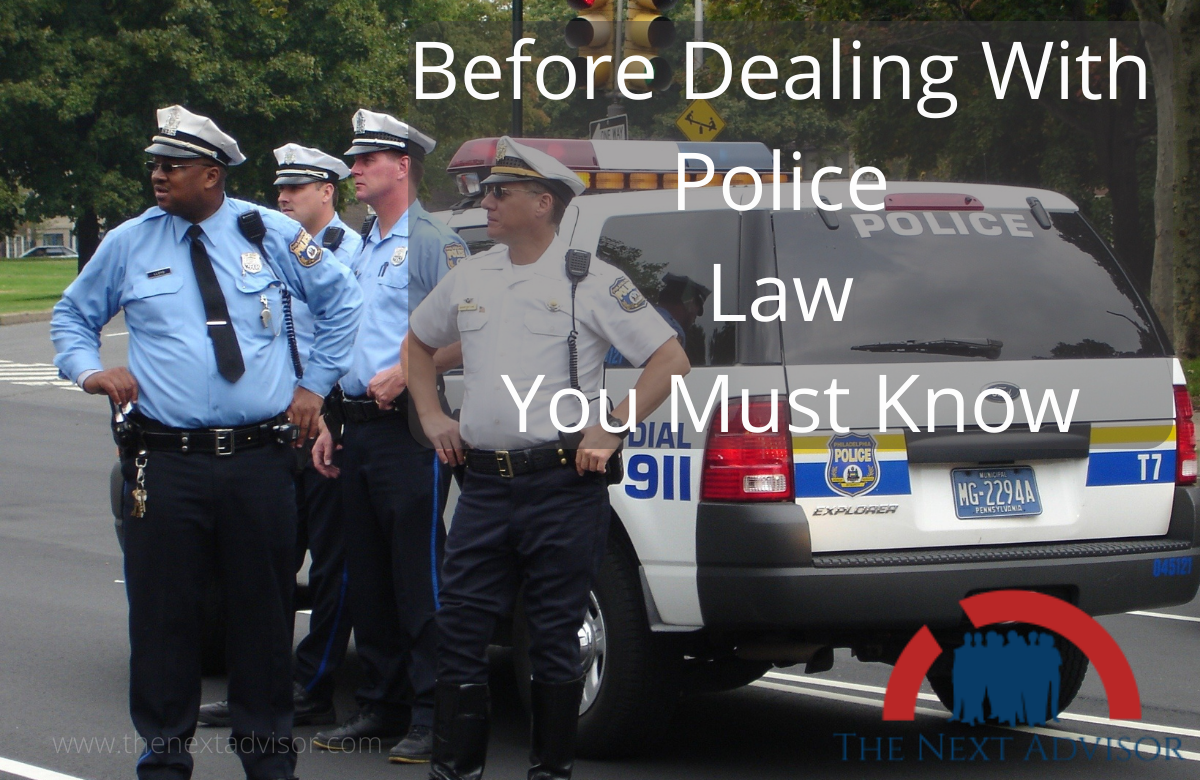Before dealing with Police laws and Rights you need to know. So if you are aware that the Police department is responsible for holding laws and order in the communities and preserving public safety as well as protecting its reputation. The preamble of the Indian Constitution shows that no one is above the law. Therefore Before Dealing With Police Laws You Must Know some basic things related to laws and rights.
Police officers are also unlikely to exercise excessive control abuse their authority to threaten people in the gap of undertaking an investigation. Police are one of society’s significant organizations and the cops happened to be the government’s most prominent leaders. In an hour of risk, threat, disaster, and challenge where the resident does not know what to do and how to contact? it happens that the Police department and Policemen are the most appropriate and available unit and individual to him.
Police are expected to be any society’s most accessible and interactive and directive organization. On the one hand, their position responsibilities, and duties within society are normal to be varied. And on the other difficult. Broadly speaking Police’s main responsibilities are Law-keeping and order keep.
However, there are numerous ramifications of these two duties, resulting in a large inventory of the Police organization’s duties, functions, powers, roles, and responsibilities. Resting very power in the hands of Police while on the other hand, it is necessary to carry out their duties leaves the door to misuse and hence human rights violation.
Article 21 of the Indian Constitution gives the lives of imprisoned, under-trials, and accused people hope. These citizens ought to be treated humanely and in the way prescribed by the statute.
Now let us see what are the rights of a person before he or she deals with the Police means before dealing with Police laws and the rights you must know are given below.
1. Section 29 of the Indian Police Act, 1861 states that if a person is at the end of the misconduct due to a Police officer’s omission of duty, the officer may be punished with up to 3 months imprisonment and up to 3 months’ salary penalty.
2. Police Complaint Authority (PCA) was formed in 2006 for managing police complaints and improving the Police system’s framework and way of operating. If there is a case of ‘serious wrongdoing the Police officers may be found responsible. Anybody who has experienced Police brutality will lodge a lawsuit with PCA.
3. The Courts have explicitly given rules specifying that, during the inquiry, a Police officer can not intimidate people and must write down minutes of the inquiry in the station log or the daily journal.
4. Only if the information does not reveal a cognizable offence and to the extent of finding the recognizability of a crime alone can preliminary inquiry be conducted. If a cognizable offence of revealed in the documents, the Police must file an FIR, so they can not obstruct the operation under the pretext of a preliminary investigation.
5. Where a Police officer fails to file an FIR, the informant can send the details to the Police Superintendent in writing. The witness or the perpetrator can even file with the Magistrate his/her case.
6. If a person is summoned on the basis of being mentioned in a petition or listed as a witness, the police officer shall request a formal subpoena under Section 160 of the Code of Criminal Procedure, 1973, stating the date and time for attendance.
7. It is also suggested that an advocate can join you if you go to the Police department to lodge a lawsuit against a Police officer.
8. During the event of Police detention, there are two records you need to know about; search memo, and detention memo. An inspection memo is important because it states how you look like before being locked up and if you have any injuries before being locked up or not, so you will not get injured during the investigation.
Memo of Detention has clear details about the incident, including witness names, and there are no lies heard by the Police perspective. This is all about before dealing with Police the laws and rights you must need.
Now let us see the Rights of the arrested person. That is also known for “Before Dealing With Police Laws You Must Know.”

Right Against Handcuffing
Section 46 of CRPC content leads to forms of detention. For example:- Surrender to imprisonment, physical handling of the body, or confining it. The arrest is the confinement of human rights were subjected to jail by gestures or by actions detention will be affected by physical communication.
When a person is required, it should not be more than is justly necessary because this provision does not grant the power who is not charged with a crime punishable by death or life imprisonment. Where a woman is to be detained, the Police officer shall not contact the woman’s body for making an arrest unless the police officer is a woman, who will be believed to be detained on her submission to custody on oral intimation. Also, no woman shall be arrested after sunset and before sunrise.
Section 50 (1) of the CrPC provides that “any Police officer or other person without a warrant shall forthwith communicate to him full details of the offence for which he is being arrested or other reasons for such arrest.” Apart from the provisions of the CrPC, Article 22(1) of the Constitution of India provides that no person arrested shall be held in the custody without as soon as possible being told of the person for such detention nor shall he be defused the right to consult and defend a legal practitioner of his choosing.
Centered on Supreme Court decisions in “Joginder Kumar Vs. The State of UP, (1994)” and “D.K. Basu vs. West Bengal State, (1997)”. Under Section 41 of the CrPC broad powers are bestowed on Police to apprehend, especially in committed crimes, without having to go to the magistrate and seek an apprehend warrant.
No lawful arrest may occur if there is no evidence or fair belief that the person has been engaged in a cognizable crime or committed the offence (s) listed in Section 41. The responsibility is on the police officer to convince the court who has the fairground of doubt in which the detention is questioned.
With the exception of the above, Section 45 of the CrPC provides that members of the Armed Forces may not be arrested for anything done in the performance of official duties, except with the central government’s consent. Section 54 of the CrPC allows for compulsory medical examination by a medical officer in the service of federal or state government, or by a licensed medical practitioner, in the case of any medical officer being unavailable.
Only female Police Officers or licensed medical professionals may treat female arrestees. However, Sections 53 & 53A of the CrPC specify that if there are fairgrounds for assuming that an inspection of the accused person on charges of rape or other crime would include evidence for the conduct of any crime, it is lawful to inspect the blood, blood traces, sperm, hair samples, fingernail, cuts using modern and experimental techniques including DNA and so on.
Section 49 of the CrPC states that there should be no more restriction than is justly appropriately to deter escape, i.e. fair force may, if required, be used for the purpose; but an arrest must take place before a person is held under some sort of constraint. It is unconstitutional to seize or prosecute without detention. Section 50 (2) of the CrPC provides that any person arrested without a warrant shall be informed immediately of the reasons for his arrest and, where the arrest is made in a bailable case, the person shall be informed of his right to be released on bail.
Section 50 is compulsory and fulfills the requirement given in Article 22(1) of the Indian Constitution. CrPC, Section 51 requires a Police officer to conduct a personal search of the people detained. Concerning the provision of this clause, reference can be made to Article 20 (3) of the Indian Constitution, which is a protection against self-incriminating testimonials.
While an accused can not be compelled to show any evidence against him, by obtaining a search warrant, he can be taken by statute from the possession of the property of the accused. It is important to follow scrupulously the civil and legal requirements to prevent an accused person before a Judicial Magistrate within 24 hours of the arrest. This is provided under Section 57 of CrPC as well as in the Khatru Vs. The state of Bihar, AIR 1983 SC 378. Section 57 applies exclusively to the issue of the incarceration period.
The intention is to bring the accused with the least delay to a competent magistrate to try or commit. The right to be released from Police custody by being a Magistrate is essential to avoid apprehension and imprisonment, with a view to obtaining evidence or as a way of forcing individuals to give information.
This is all about Before Dealing With Police Laws You Must Know, and now nothing is remained to know about the laws related to the topic which is “Before Dealing With Police Laws You Must Know”.

























